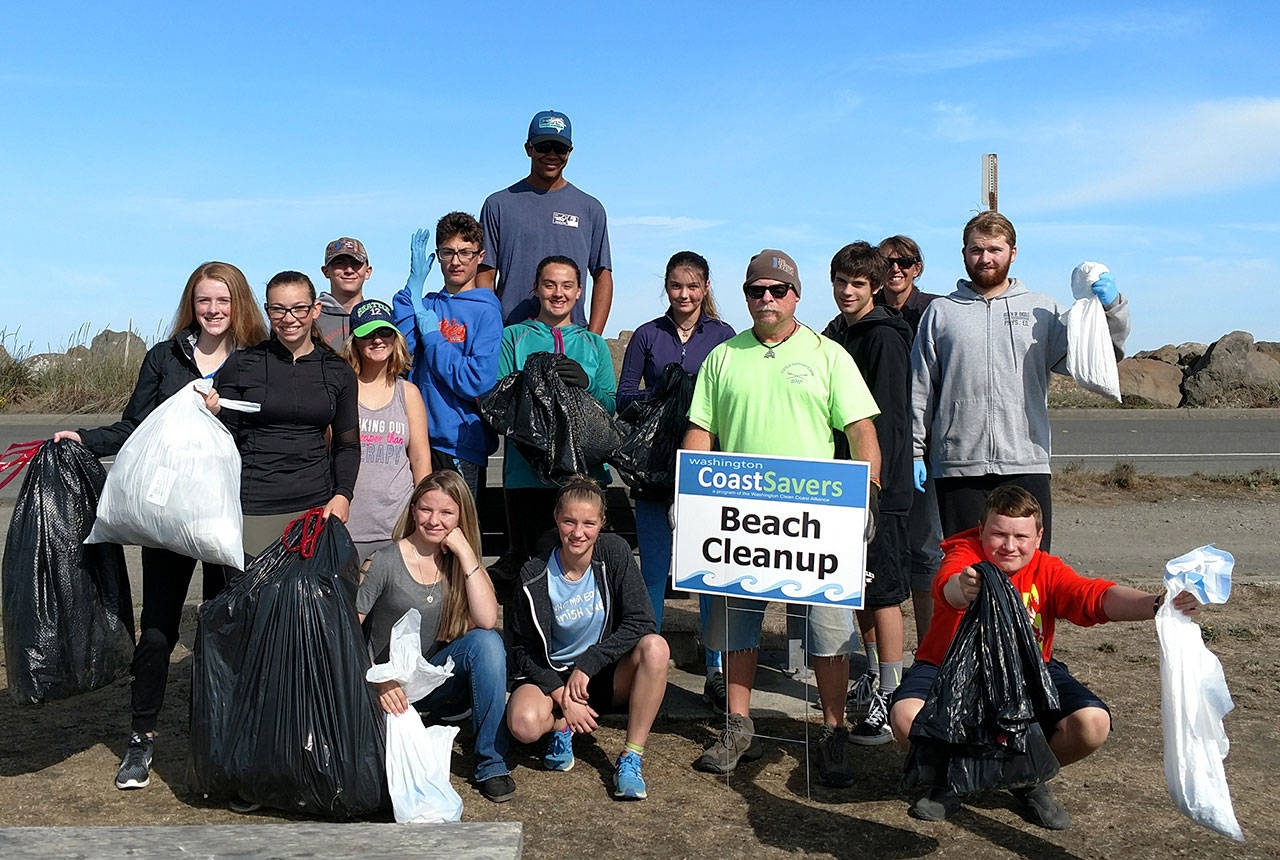More than 650 volunteers cleared some 6 tons of debris from Washington’s Pacific Coast and Strait of Juan de Fuca beaches during the International Coastal Cleanup, said the coordinator of Washington CoastSavers.
Volunteers cleaned more than 50 beaches along the outer coast and the Strait on Sept. 16, said Jon Schmidt of Sequim, Washington CoastSavers coordinator.
The Ocean Conservancy organizes the International Coastal Cleanup (ICC) on the third Saturday of September. Washington CoastSavers serves as the cleanup coordinator in Washington state.
“Our volunteers who clean the wilderness coast of Olympic National Park often have to hike several miles just to get to the beach,” Schmidt said.
“They then collect what they can fit into and onto their packs, often using quite creative means to carry it out since no wheels are allowed.
“Carrying water-soaked foam, discarded tires or rope coated with seaweed and other growth adds up to a heavy burden. These individuals are dedicated volunteers, many of whom participate in every beach cleanup they can.”
Trash found at ICC events will be included in an annual index of global marine debris to be released in 2018, Schmidt said.
Last year, nearly 800,000 volunteers collected more than 18 million pounds of trash from shorelines around the world.
Much of the trash plucked from beaches is plastic.
And that’s only a minuscule amount of the plastic in the oceans.
Of the nearly 300 million tons of plastic produced each year, more than 8 million tons are dumped into the sea, according to Plastic Oceans Foundation.
Plastic takes 400 years to degrade in water, the foundation said.
“Seals get caught in discarded fishing gear and die trying to free themselves,” according to the Ocean Conservancy. “Dolphins mistake plastic bags for their next meal and die eating them. Fish ingest deflated balloons and choke to death.”
Plastics form part of the sludge in what has been termed “the great Pacific garbage patch” in the central north Pacific Ocean.
Polystyrene has been found on remote ice floes in the Arctic Ocean and microplastics have been found in sea salt, according to The Guardian.
“When I clean the beach, many of the things I find are items that are disposable items used for only minutes such as straws, bags, cigarettes butts and water bottles — all this plastic stuff that will last forever,” Schmidt said.
“Our beaches are our treasures. We need to consider how our actions affect the places we love.”
Schmidt offered tips for reducing the amount of plastic in the sea:
• Reduce your packaging by buying bulk or concentrated products.
• Select reusable products such as sturdy, washable utensils, tableware, cloth napkins and dishcloths that can be used many times.
• Use durable products: choose furniture, sports equipment, toys, and tools that will stand the test of time.
• Reuse products: reuse newspaper, boxes, shipping “peanuts” and “bubble wrap” to ship packages.
• Buy products made from recycled material. Many bottles, cans, cereal boxes, containers and cartons are made from recycled material.
• Organize a recycling drive in your neighborhood or school. Collect bottles, glass, plastic and newspapers and take them to your local recycling center.
• Carry your own shopping bags.
• Reduce purchasing of unrecyclable plastic.
• Wash and reuse plastic food containers for storing food items instead of buying throwaway plastic bags. Maintain and repair durable products.
CoastSavers had partnered with TerraCycle to turn some of the plastic material collected into shampoo bottles. However, hurricanes in the Atlantic delayed shipment of sacks.
Instead, the Olympic Coast National Marine Sanctuary had a sack from April’s cleanup that was partially filled with plastics collected from the beaches around Neah Bay — about 20 pounds, Schmidt said.
This year’s beach cleanup was aided by partnerships with State Parks, the Pacific Coast Shellfish Growers Association and Pacific Northwest Four Wheel Drive Association, Schmidt said. The latter two organizations worked on the south Pacific coast.
Washington CoastSavers is an alliance of partners and volunteers dedicated to keeping the state’s beaches clean of marine debris.
Founding members include representatives of the Lions Club International, Discover Your Northwest, Surfrider Foundation, Grass Roots Garbage Gang, Olympic Coast National Marine Sanctuary, Olympic National Park and the Washington State Parks and Recreation Commission. Since 2007, their efforts have removed tens of tons of trash off the beach during the Washington Coast Cleanup which occurs in April every Earth Day weekend. This is the fifth year the organization has participated in the International Coastal Cleanup.
The next coast-wide beach cleanup, the Washington Coast Cleanup, will be April 21.
See www.coastsavers.org for more information.
________
Executive Editor Leah Leach can be reached at 360-417-3530 or at lleach@peninsuladailynews.com.

